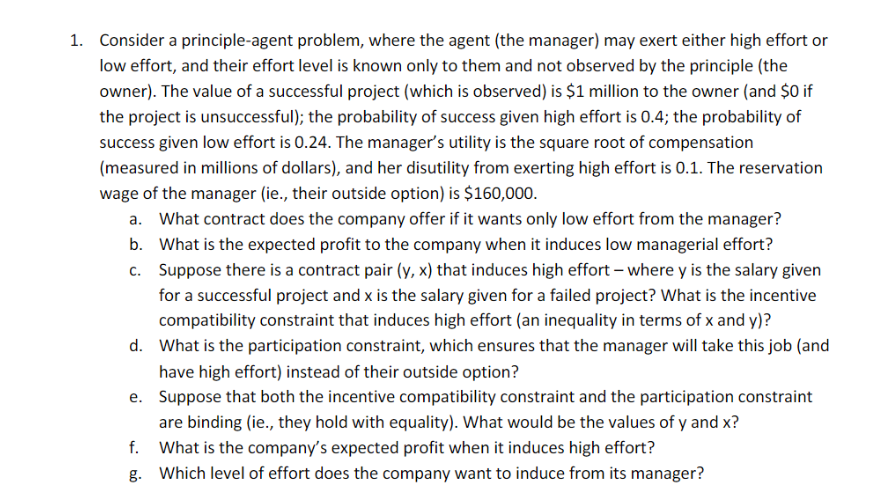
1. Consider a principle-agent problem, where the agent (the manager) may exert either high effort or low effort, and their effort level is known only to them and not observed by the principle (the owner). The value of a successful project (which is observed) is $1 million to the owner (and $0 if the project is unsuccessful); the probability of success given high effort is 0.4; the probability of success given low effort is 0.24. The manager's utility is the square root of compensation (measured in millions of dollars), and her disutility from exerting high effort is 0.1. The reservation wage of the manager (ie., their outside option) is $160,000. a. What contract does the company offer if it wants only low effort from the manager? b. What is the expected profit to the company when it induces low managerial effort? C. Suppose there is a contract pair (y,x) that induces high effort - where y is the salary given for a successful project and x is the salary given for a failed project? What is the incentive compatibility constraint that induces high effort (an inequality in terms of x and y)? d. What is the participation constraint, which ensures that the manager will take this job (and have high effort) instead of their outside option? e. Suppose that both the incentive compatibility constraint and the participation constraint are binding (ie., they hold with equality). What would be the values of y and x? f. What is the company's expected profit when it induces high effort? g. Which level of effort does the company want to induce from its manager? 1. Consider a principle-agent problem, where the agent (the manager) may exert either high effort or low effort, and their effort level is known only to them and not observed by the principle (the owner). The value of a successful project (which is observed) is $1 million to the owner (and $0 if the project is unsuccessful); the probability of success given high effort is 0.4; the probability of success given low effort is 0.24. The manager's utility is the square root of compensation (measured in millions of dollars), and her disutility from exerting high effort is 0.1. The reservation wage of the manager (ie., their outside option) is $160,000. a. What contract does the company offer if it wants only low effort from the manager? b. What is the expected profit to the company when it induces low managerial effort? C. Suppose there is a contract pair (y,x) that induces high effort - where y is the salary given for a successful project and x is the salary given for a failed project? What is the incentive compatibility constraint that induces high effort (an inequality in terms of x and y)? d. What is the participation constraint, which ensures that the manager will take this job (and have high effort) instead of their outside option? e. Suppose that both the incentive compatibility constraint and the participation constraint are binding (ie., they hold with equality). What would be the values of y and x? f. What is the company's expected profit when it induces high effort? g. Which level of effort does the company want to induce from its manager







